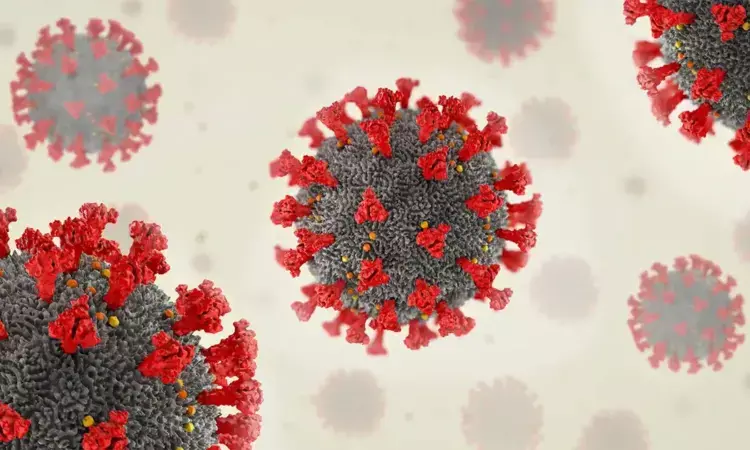- Home
- Medical news & Guidelines
- Anesthesiology
- Cardiology and CTVS
- Critical Care
- Dentistry
- Dermatology
- Diabetes and Endocrinology
- ENT
- Gastroenterology
- Medicine
- Nephrology
- Neurology
- Obstretics-Gynaecology
- Oncology
- Ophthalmology
- Orthopaedics
- Pediatrics-Neonatology
- Psychiatry
- Pulmonology
- Radiology
- Surgery
- Urology
- Laboratory Medicine
- Diet
- Nursing
- Paramedical
- Physiotherapy
- Health news
- Fact Check
- Bone Health Fact Check
- Brain Health Fact Check
- Cancer Related Fact Check
- Child Care Fact Check
- Dental and oral health fact check
- Diabetes and metabolic health fact check
- Diet and Nutrition Fact Check
- Eye and ENT Care Fact Check
- Fitness fact check
- Gut health fact check
- Heart health fact check
- Kidney health fact check
- Medical education fact check
- Men's health fact check
- Respiratory fact check
- Skin and hair care fact check
- Vaccine and Immunization fact check
- Women's health fact check
- AYUSH
- State News
- Andaman and Nicobar Islands
- Andhra Pradesh
- Arunachal Pradesh
- Assam
- Bihar
- Chandigarh
- Chattisgarh
- Dadra and Nagar Haveli
- Daman and Diu
- Delhi
- Goa
- Gujarat
- Haryana
- Himachal Pradesh
- Jammu & Kashmir
- Jharkhand
- Karnataka
- Kerala
- Ladakh
- Lakshadweep
- Madhya Pradesh
- Maharashtra
- Manipur
- Meghalaya
- Mizoram
- Nagaland
- Odisha
- Puducherry
- Punjab
- Rajasthan
- Sikkim
- Tamil Nadu
- Telangana
- Tripura
- Uttar Pradesh
- Uttrakhand
- West Bengal
- Medical Education
- Industry
COVID-19 treatment in outpatient settings: ACP Updates rapid practice points

COVID-19 Case at SMCH Raises Concerns
USA: A recent paper published in Annals of Internal Medicine presents the American College of Physicians's (ACP's) living, rapid practice points focusing on 22 outpatient treatments for COVID-19, specifically addressing the dominant SARS-CoV-2 Omicron variant.
The document summarizes the latest evidence on the use of pharmacologic and biologic treatments of COVID-19 in the outpatient setting, specifically addressing the dominant severe acute respiratory syndrome coronavirus 2 (SARS-CoV-2) Omicron variant.
As reports reveal a late-summer and fall rise of COVID-19 cases and the continued presence of dis- and misinformation about the transmission, vaccines, and treatments, it’s critical to identify evidence-based treatments for COVID-19 that continue to evolve with new data.
Researchers for ACP reviewed two randomized controlled trials and 6 retrospective cohort studies to assess the benefits and harms of 22 different COVID-19 treatments. Treatments supported in the updated guidance include the consideration of molnupiravir or nirmatrelvir-ritonavir to treat symptomatic patients with confirmed mild to moderate COVID-19 in the outpatient setting who are within five days of the onset of symptoms and at a high risk for progressing to severe disease.
The practice points do not support the use of ivermectin or sotrovimab to treat patients with confirmed mild to moderate COVID-19 in the outpatient setting. In addition, there are 18 other treatments for which no eligible studies were identified for the Omicron variant. More research is needed about the effectiveness of treatments and if effectiveness varies by patient characteristics, immunity status, symptom duration, and disease severity of COVID-19 in the outpatient setting.
Risk stratification is an important step before deciding the best approach to manage COVID-19 in the outpatient setting. The practice points note that the decision to initiate treatment for COVID-19 in the outpatient setting should be personalized and based on clinical judgment. Best practice is to use an informed decision-making approach with patients regarding potential treatment benefits and harms; patient characteristics (such as risk factors, comorbid conditions, and disease severity); patient preferences, and social determinants of health. Clinicians should review all medications and potential drug interactions before initiating outpatient treatment for COVID-19.
Practice Point 1:
Consider molnupiravir to treat symptomatic patients with confirmed mild to moderate COVID-19 in the outpatient setting who are within 5 days of the onset of symptoms and at a high risk for progressing to severe disease.
Practice Point 2:
Consider nirmatrelvir–ritonavir combination therapy to treat symptomatic patients with confirmed mild to moderate COVID-19 in the outpatient setting who are within 5 days of the onset of symptoms and at a high risk for progressing to severe disease.
Practice Point 3:
Do not use ivermectin to treat patients with confirmed mild to moderate COVID-19 in the outpatient setting.
Practice Point 4:
Do not use sotrovimab to treat patients with confirmed mild to moderate COVID-19 in the outpatient setting.
ACP’s Population Health and Medical Science Committee will maintain these practice points, as living by monitoring and assessing the impact of new evidence and updating as needed.
Reference:
Amir Qaseem, Jennifer Yost, George M. Abraham, Rebecca Andrews, Janet A. Jokela, Matthew C. Miller, and Linda L. Humphrey, Outpatient Treatment of Confirmed COVID-19: Living, Rapid Practice Points From the American College of Physicians (Version 2),https://doi.org/10.7326/M23-1636.
Dr Kamal Kant Kohli-MBBS, DTCD- a chest specialist with more than 30 years of practice and a flair for writing clinical articles, Dr Kamal Kant Kohli joined Medical Dialogues as a Chief Editor of Medical News. Besides writing articles, as an editor, he proofreads and verifies all the medical content published on Medical Dialogues including those coming from journals, studies,medical conferences,guidelines etc. Email: drkohli@medicaldialogues.in. Contact no. 011-43720751


